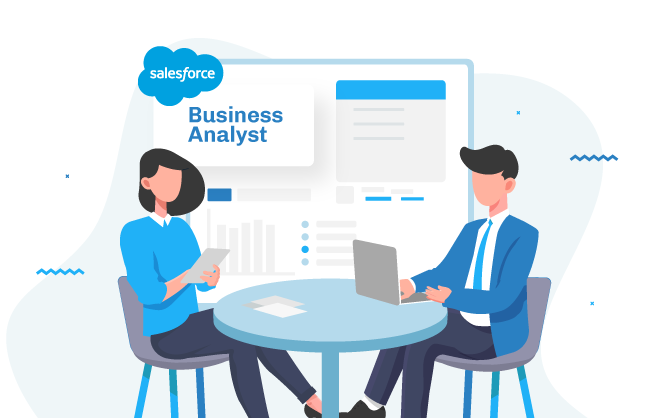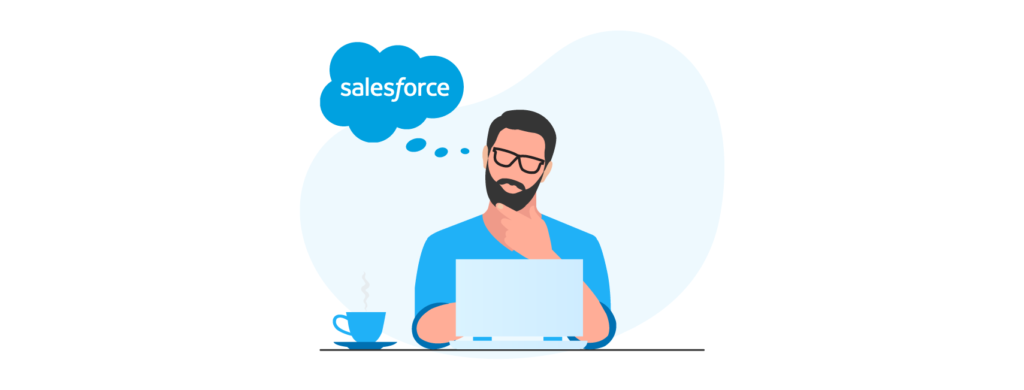The demand for Salesforce Business Analysts has grown at a high rate. Salesforce orgs have evolved, and have become more complex. As a result, there’s an increased need to evaluate the desired changes and get a full ‘lay of the land’, then ensure everyone is ‘on the same page’. This is why organizations should seek a Business Analyst.
Business Analysts are involved throughout the whole process. From idea, to discovery (gathering needs) and process mapping, then right through to ensuring the project is delivered, sufficient testing has been completed, and users actually like using the system (i.e. user adoption).
Business Analysts also help ‘steer the ship’ with technical debt, which is caused by choosing short-cuts or the wrong/incomplete solution, versus taking the time to discover business needs beyond the short-term. Laden with tools and technology the organization has outgrown, the time/cost of additional rework becomes a burden.
The right amount of governance, alignment with stakeholders, and documentation has resulted in the demand for Salesforce Business Analysts – or Salesforce professionals who are proficient in business analysis skills. After all, there’s proof in the Salesforce Business Analyst Career Path and the highly anticipated Salesforce Business Analyst certification.
Another important point to make: Business Analyst roles will take different ‘shapes’. You could be an in-house Business Analyst, or working for a Salesforce consulting partner. The interview questions you are asked will vary depending on the organization, and the size of the project the organization is looking to undertake.
- For in-house Business Analysts (i.e. working on your own organization’s Salesforce org), you should also review the Admin Interview questions.
- For external Business Analysts (i.e. working at Salesforce consulting partners), you should review the Consultant and/or Project Manager interview questions.
In this article, I’ve compiled a list with some of the more targeted questions you could expect when interviewing for a Salesforce Business Analyst role – with some insight on how you might approach the answer to them.
Warm-Up Questions
1. Tell me about yourself.
Although not a question, almost every interview (Salesforce or otherwise) is going to start with a question where you get the opportunity to talk about yourself.
Do not make the mistake of turning it into a long bullet-by-bullet breakdown of your employment history. This may be your only opportunity to leave the interviewer with what you want them to know about you. Choose your words carefully and practice what you’re going to say beforehand. Try to keep your answer under two minutes.
For Salesforce Business Analysts, this is a good time to bring up when you discovered Salesforce and your transferable soft skills too.
2. Why Salesforce?
Salesforce professionals are known for being passionate about, well, Salesforce – but saying “I just love it” isn’t enough here. Some reasons that expand on your love that you might bring up in the interview:
- The Community: Let your interviewer know that you’re able to harness the power of the Salesforce “Ohana” to further your Salesforce knowledge, learn best practices, and keep up with changes. If your interviewer is a Salesforce MVP or Trailhead Community Group Leader, they’ll like this answer even more.
- Trailhead: Salesforce’s learning management system and community boards, Trailhead, is free, comprehensive, and fun. By mentioning Trailhead, you can show that you know where to find answers to Salesforce questions, learn more about the platform and products, and connect with other professionals. With this and the previous answer, you will come across as resourceful, a people person (very important for BAs), and a continuous learner who won’t entirely rely on their employer for all of their Salesforce knowledge.
- Helping People/Helping Businesses: Business analysts are often driven by the thrill of digital transformation changing people’s working lives by removing pain points and optimizing business processes. Salesforce is an amazing means to this end which is often why BAs tend to gravitate towards it.
3. What experience have you had as a Business Analyst?
This question is fairly straightforward if you’ve had experience as a business analyst, but if you haven’t, it’s time to let those transferable skills shine. Ask yourself, have you ever held a position, professionally or even personally (PTA meetings count!), that required you to:
- Speak to someone so you could thoroughly understand a problem and then propose a solution?
- Write documentation?
- Be client facing?
- Run meetings?
- Create presentations?
These and other types of transferable skills, where you’ve done work that a BA does but without the title, are excellent to bring up here.
4. What qualities do you think make a good Salesforce Business Analyst?
A Salesforce BA acts as the translator between the business and the technical team. To do that effectively, a BA needs to have solid communication skills, such as being able to write clearly and communicate technical concepts in a non-technical way. They need to speak clearly and confidently.
More than soft skills though, business analysis requires emotional intelligence. Empathy is key when engaging with business stakeholders. When you’re embarking on a digital transformation project, business stakeholders can often feel defensive. They might feel as though their ways are not valuable or that you’re going to try to come in and tell them that they don’t do their job well.
Sometimes business requirements gathering interviews can feel more like business therapy sessions, but tapping into those feelings of pain, resentment, and frustration when gathering requirements often means you’re getting to the real picture of the business and that’s a wonderful thing. When your stakeholders feel like you’re there to genuinely help them, you’ll more easily become a trusted advisor to them.
5. Do you have any questions for me?
This usually comes at the end of the interviewer/s’ questions – do not drop the ball here!
This is your time to give the interviewer a sense of what it would be like in a business requirements gathering session with you. This is the time to ask questions so you are clear about the responsibilities of the role, what the company does, and what success looks like. Take control of that meeting, just like you would a stakeholder interview, and be confident while asking great questions.
Stakeholder Management
6. How would you handle a business stakeholder adding new requirements beyond the agreed upon scope of work?
Scope creep is a huge risk for any Salesforce project which is why having a clear, well defined project plan is so vital. That being said, stakeholders are going to stakeholder, and that means that they are likely to ask for things outside of the scope of the project in the hopes that you can ‘squeeze it in’. As a BA, it’s important to listen to the new requirement and then outline the risks to the project and options. Should it move to a phase two? Should something be removed from the scope in order to bring it in?
Having a formal change management process of review and approval will ensure that unauthorized changes do not derail the project.
7. How would you deal with a stakeholder who was…
- Unresponsive?
- Not being forthcoming with information?
- Being difficult?
For BA interviews, it is likely you’ll get some version of a question with how to manage a challenging business stakeholder. Having an agreed upon stakeholder management plan in place will help set expectations as far as the responsibilities of each stakeholder. It will make it easier to point out when a stakeholder is acting in a way contrary to the established plan.
Once a challenging stakeholder has been identified, a common approach is to set up one-on-one time with them to reiterate their importance to the project. Understanding their motivations and concerns then validating those could help to rebuild the trust between you. At the same time, it is important to keep the project moving forward. A BA may have to call out the risk to the project manager should the stakeholder not get on board.
Project Management
8. What do you do when you’re blocked on a problem?
How you approach this will depend on the issue you’re blocked on. In general, BA work tends to involve a team who you can reach out to, including your project manager, if you need support with anything. Outside of your team, showcasing your resourcefulness by leveraging the Trailblazer community, Salesforce help, and Trailhead to do research on features and solutions you might be less familiar with are also great options. The important part is to get across that while you may not always have the answers, you’re confident that you’ll always be able to find the answers.
9. Besides Salesforce, what are examples of software you have used as a business analyst?
This could look a little different based on your personal experience and the specifics of projects you’ve been on, but here are some programs that business analysts often use:
- User Stories: Jira, Elements.cloud, Salesforce, Trello.
- Business Process Mapping: Visio, LucidChart.
- Training Documentation: Confluence, OneNote, Notion, Google Suite, Microsoft Suite, Salesforce.
- Project Management: Jira, Smartsheet, Notion.
- Note Taking: One Note, Google Suite, Microsoft Suite.
- Meetings: Zoom, Google Hangouts, Teams.
10. Have you ever worked on an Agile team?
Per Trailhead, “Salesforce business analyst is a project-based, business-improvement role”. Being project based, it’s important to acknowledge that Salesforce initiatives tend to use Scrum or other Agile methodologies to facilitate those projects. Having a clear understanding of how an Agile team works tends to be key for BAs.
Whether you have Agile experience or not, I cannot recommend getting a Certified Scrum Master or Certified Scrum Product Owner credential through the Scrum Alliance enough. They’re both easy, two-day courses that allow you to have an easy answer to this question:
Interviewer: “Have you ever worked on an Agile team?”
You: “I’m a Certified Scrum Master.”
Done!
In the absence of an Agile credential, what the interviewer will be looking for is to gauge how much training they would have to give you on the methodology should you join their team. By demonstrating a clear understanding of how a typical Scrum team works and dropping in those Agile vocabulary words (such as “Sprint,” “Retrospective,” and “Definition of Done”), you’ll do a lot to convince them that you could hit the ground running.
11. Which methodology do you prefer? Agile or Waterfall?
This one is a bit of a trick question. While most Salesforce projects tend to use Agile methodology, it’s not always the best way to deliver a project. A question like this is designed to see if you understand the differences between the two methodologies and whether you’re comfortable with them. The main things to know are:
- Waterfall is best when the budget or time to deliver is fixed, the outcome of a project is predictable, and the requirements are well defined.
- Agile is used when the requirements are expected to evolve and the project is delivered incrementally. The business stakeholders are deeply involved throughout the process.
- A lot of companies, especially consultancies, will use some combination of Waterfall and Agile for their standard project delivery methodology, so try not to hate on one or the other because you don’t want to accidentally insult them.
So maybe the best answer here is: “Tell me more about the project”.
Discovery
12. How do you gather requirements? What kinds of questions do you ask?
Some common ways to elicit requirements are:
- Brainstorming sessions
- Interviews
- Document Analysis
- Demos of current systems
- Surveys / Questionnaires
- Requirements Workshops
- Observation
The word you must absolutely include in this answer is, “why?”. BAs are not supposed to be order takers – it’s essential that a Salesforce BA understands why a business process is the way it is.
Some other common questions are:
- What are your pain points?
- What documentation do you have on this process?
- What does success look like to you?
- How do you do this today?
- Who are the people involved in the process?
- What other systems are involved in the process?
- What are the hand offs?
- Any exceptions? “What if…” questions
- Did I miss anything?
More than listing off techniques though, this question is a great opportunity to discuss things like how important it is to get the right stakeholders in the room. For example, managers and workers can often have vastly different needs and viewpoints on the efficiency of the process. You can also use this question to discuss how important empathy and trust are when you gather requirements.
13. How would you go about identifying areas in a business process to improve?
Besides asking the stakeholders their opinions (pain points almost always lead to business process improvement), this is a great time to bring up business process mapping. Mentioning something like a Value Stream Map will not only win you vocabulary points and indicate that you have tools in your BA toolbelt, but it will also show that you understand when to use them.
A great expression to work into this answer comes from Ash Finnegan, Digital Transformation Officer at Conga. It stuck with me, and it always lands well in interviews: “If you take a bad process and add technology, you just get a faster bad process”.
14. How do you prioritize business requirements?
This is a great question to discuss how you would work closely with the Product Owner to prioritize the backlog. Getting in the vocabulary word “backlog” is key here, and if you want to get fancy, bust out some Agile prioritization methods.
15. When do you know that you are done gathering requirements?
When requirements gathering sessions are failing to deliver any new significant changes to the requirements and you start hearing the same things you’ve already heard, you are likely done. Reviewing your requirements with the business and validating that you’ve captured everything they wanted you to know will also help you understand if there’s more for you to know.
16. What is the difference between acceptance criteria and user stories?
User stories aim to capture what a user wants and why they want it. It focuses more on the experience of the end user. On the other hand, acceptance criteria indicate what needs to be true in order for the user story to be considered successfully delivered. User stories alone are usually not good enough on their own to configure or code from. The pairing of the user story with acceptance criteria is where the magic happens.
Bonus: Acceptance criteria are a great starting point for test scripts for Quality Assurance (QA) and User Acceptance Testing (UAT).
17. Have you ever written a user story? What makes a good one?
If you have written a user story, you should be all set for the first part of this question. If you haven’t, you should! Just like prospective admins will spin up Salesforce development orgs to practice configuration, BAs can also do the same thing, but try writing out the user stories first. Joining a Clicked skills challenge or admin/analyst Quest can also give you some free hands on experience creating solid user stories.
As for what makes a good one, the INVEST acronym used in Agile can be helpful here:
- Independent: It shouldn’t duplicate or overlap with another user story. This allows flexibility in prioritizing the user story backlog.
- Negotiable: User stories will absolutely evolve over the course of a project.
- Valuable: No point in writing it otherwise if it’s not worth something to the user.
- Estimable: You should get a sense for how long it will take to complete.
- Small: Smaller user stories are easier to estimate, make the team feel accomplished because they can be delivered faster, and don’t hold up massive pieces of functionality if something goes wrong further down the application lifecycle.
- Testable: Acceptance criteria are key to successfully delivering a user story, so the user story must be clear enough so that success is definitive.
18. Have you ever done any business process mapping or diagramming?
Ultimately what is necessary to get across here is that business process mapping is a tool in your BA toolbelt and that you understand and can communicate the value of it. Business process mapping can often visually communicate difficult processes more easily than other types of documentation. They are great for identifying waste, improvements, and proposed changes in a process. Universal Process Notation (UPN) is gaining popularity when it comes to business process mapping for Salesforce projects, so it also would be great to mention here.
While there are many types of formal business process maps, having mapped something using an unconventional format and discussing that here is better than nothing.
Teamwork
19. Do you prefer to work as part of a team or individually? Why?
As I said before, Trailhead say “Salesforce business analyst is a project-based, business-improvement role.” Project-based means team, so first make sure your answer is “team” all the way for this question. As for the “Why,” you can elaborate on how much you love working with people, helping to document team processes, and how you understand the importance of the BA role to be the bridge between the business and the team.
20. What do you think makes a successful team?
This is a great spot to discuss Agile team dynamics. Agile teams evolve so that they get better and better as the project goes along. This requires a commitment to the team, the project, and Agile principles. The best Agile teams are self-organizing, cross-functional, and highly collaborative.
Agile greatness aside, this is also a great spot to introduce a feel good team story from your past. Agile or not, most people have been on a team of some kind in their lives before they interview for a job. Even if you have a story about the secret sauce that made your kindergarten Little League team successful, it’s worth sharing – Interviewers remember stories.
Salesforce Knowledge
21. Have you ever created a Salesforce Flow?
Do not stress if this question comes up. The flow question is often a way for interviewers to assess how comfortable you are with low code configuration. The important thing is to be honest. If you’re applying for a Salesforce BA role and they need you to be an expert on flows, then it’s possible that they’re not actually looking for a Salesforce BA and the role might be a bad fit.
All that being said, if you can write a killer flow, say so. Tell a story about how you discovered the business problem, solved it with flow, documented that flow, and all the time or money it saved.
If you can’t write a killer flow yet, then after being brief, but honest, focus more on what you can offer a team as far as configuration goes. Do you love formulas? UI/UX? What can you offer an existing configuration team in terms of support? You can also talk about how enthusiastic you are to increase the depth of your Salesforce knowledge by diving more into configuration (if that is the case).
As a final note here, Salesforce BAs that at the very least understand the power of Salesforce automation and the possibilities and limits of using flow are that much better at coaching their stakeholders into what is possible.
22. Do you have any Salesforce certifications?
Again, be honest here as any potential employer can easily verify your Salesforce credentials on Trailhead. You can also use this as an opportunity to discuss any other certifications or credentials that you may have earned that will showcase your business analysis skills like the CBAP, ACBA, or CSM.
For folks that have asked me, my recommended cert path for a Salesforce Business Analyst would be:
- Salesforce Admin: Almost every Salesforce BA job asks for it.
- Scrum Alliance Certified Scrum Master: See Question 10 above about why I think this is a good one.
- Salesforce Consultant (Sales, Service, Marketing…): If the cloud you plan on specializing in has a certification, get it. While that Salesforce Business Analyst Certification is definitely worthwhile, it is still new and not a whole lot of Salesforce customers know it exists yet. Consultant certs will also better prepare you for an entire project delivery.
- Salesforce Business Analyst: Self explanatory. If the admin exam was rough and you need a quicker win, then it’s probably okay to do this one before the consultant exam.
After these: Strategy Designer, User Experience Designer, and Platform App Builder.
23. Which Salesforce ‘clouds’ do you have experience with?
A common question where they will want to make sure that their tech stack aligns with your experience. After sharing your Salesforce experience, you can also bring up any major AppExchange products that you’re familiar with that might be relevant depending on the industry of the company you’re interviewing with.
It’s also a good time to talk about how you’d love to expand the breadth of your Salesforce knowledge by exploring new clouds (and have some in mind in case they follow up with “which ones?”). If you’re interviewing with a Salesforce Partner, doing a little research on the AppExchange can help you figure out which clouds might be relevant to that firm too.
24. How do you keep your Salesforce skills and knowledge up-to-date?
Besides leveraging some of the resources already mentioned in this article about Trailhead and the Trailblazer community, this is a great time to mention how you keep up with Salesforce’s three yearly releases.
As business analysts, particularly ones that work for Salesforce customers, a likely part of the job will be understanding the new features that will be released, presenting relevant ones to business stakeholders, collecting feedback, adding them to the backlog when appropriate, and seeing them through the implementation lifecycle.
Experience
25. Have you ever taken part in User Acceptance Testing (UAT)? What was your role?
Business analysts tend to play a key role in UAT since they are so familiar with the requirements and stay close to the stakeholders. UAT Test scripts are often built off of user story acceptance criteria as well.
You can answer “Yes” to this question though if you’ve ever had a part in testing software before release. Were you a tester? Did you write test scripts? Did you write the instructions that the testers had to follow? Did you run the whole UAT process? Did you document any gaps discovered between the results of the tests and the requirements? How were those handled?
There is a lot involved in having users see new features or software for the first time. Make sure your answer communicates your experience as well as your understanding why UAT must be thorough and documented well before a go-live.
26. Have you delivered any Salesforce training to end users?
Training Salesforce end users is one of those tasks that absolutely must get done and get done well to ensure adoption (no point in building something no one uses), but there is rarely a dedicated resource to handle it. Since Salesforce BAs tend to work so closely with the end users, they often end up wearing the training hat, so don’t be surprised if this question comes up.
If you have had to provide training to end users in the past, you can communicate numbers like how many hours of training you’ve delivered or how many users you’ve delivered training to. This is also a good spot to highlight other training contributions. Did you deliver the training in person? Did you create training videos? Did you help write the curriculum? Did you contribute any configuration to support training such as In-App Guidance or Guidance for Success?
If you haven’t done any Salesforce end user training, feel free to cite other training you’ve conducted outside of Salesforce projects. It’s also okay to discuss your empathy for end users and how thoroughly you can immerse yourself into their business processes will make you the best person for the task.
27. Describe a Salesforce project you worked on and your contribution.
This question is trying to gauge your experience level in a way very similar to Question 3. Here are a few different ways to approach it:
- If you have no previous Salesforce project experience: Talk about volunteer or simulated Salesforce projects, i.e. a Clicked Quest. If not, talk about what you’re most looking forward to contributing and where you think your skills set could add value to your first Salesforce project based on either other successful non-Salesforce projects or your Salesforce studies.
- If you only have experience as an end user: It is okay to bring up your experience even if your only experience was as an end user that was part of a roll out for a new feature or you contributed valuable feedback. What was done well or what would you have done differently?
- If you have several projects to pick from: Aim for the one that would most closely align with the industry and job that you are applying to. Don’t forget to mention the size of the project and the specifics of your contribution with a focus on BA skills like documentation, elicitation, and stakeholder management.
28. Have you ever created documentation? Please elaborate.
Even if it wasn’t on a Salesforce project, bringing up times that you’ve created training material, how-to documents, diagrams, and even helpful to-do lists can be mentioned here. Professional examples where you can describe what you did, why the documentation was important, to who, and how it helped are best.
Worst case, you can talk about that time you left detailed instructions for your teenager about how to use the washing machine while you were out of town and they didn’t burn the house down.
29. Is the goal to be an admin or a BA? Where do you see your career headed and why?
While lying is not generally recommended, companies do tend to favor people that feel called to do the type of work the role is advertising. So why do people feel passionate about Salesforce Business Analysis? Some good reasons:
- They love making people’s lives easier through Salesforce.
- They’re inquisitive and enjoy figuring out how processes work and improving them.
- Organizing, creating visuals, and documenting information is a passion of theirs.
- They like working with teams and people to deliver value.
- They understand that quality business analysis is required in order to build the right things in Salesforce.
As far as career paths, while folks can happily stay in business analyst roles forever, as BAs discover more about the technical side of the Salesforce platform (through the continuous learning they should be doing), they often move into functional consultant, solution architect, product manager, and product owner roles.
30. Describe a time you made an error. What steps did you take after?
It’s a good idea to have one of these stories in your ‘back pocket’. While it doesn’t have to be BA specific, showing a time where you discovered an error, took responsibility, and then took steps to correct it (with a happy ending) can demonstrate that you’d be prepared to deliver bad news.
Being the bridge between the business and the technical team, BAs often have to deliver difficult news to stakeholders and sometimes the technical team. Perhaps a demo was ill-received, perhaps the level of effort was miscalculated, perhaps a go-live date needs to be pushed due to the results of UAT – being able to frame a difficult situation in a way that will mobilize the people involved to correct it with minimal hard feelings is a great skill to have as a business analyst.
Summary
In addition to the questions above, it’s important to remember that the interviewer will also be gauging whether they feel comfortable putting you in front of a business stakeholder or not. Exuding confidence, being friendly, smiling, asking good questions, and speaking clearly are all things that are important for any interview, but particularly vital for Salesforce BA roles.
If you want to polish up on Salesforce BA best practices before you go in, check out these resources:
- Build Your Business Analyst Career on Salesforce
- Prepare for Your Salesforce Business Analyst Credential Trailmix
- BA courses on Elements Academy offered for free by Elements.cloud
- Purposeful Architect blog.
Even if you decide that being a business analyst is not for you, these business analysis skills are still vital to Salesforce admins, architects, and consultants too.
Good luck out there, #BadAssBA! These old Salesforce orgs and new implementations need you. So for all our sakes – get interviewing!







